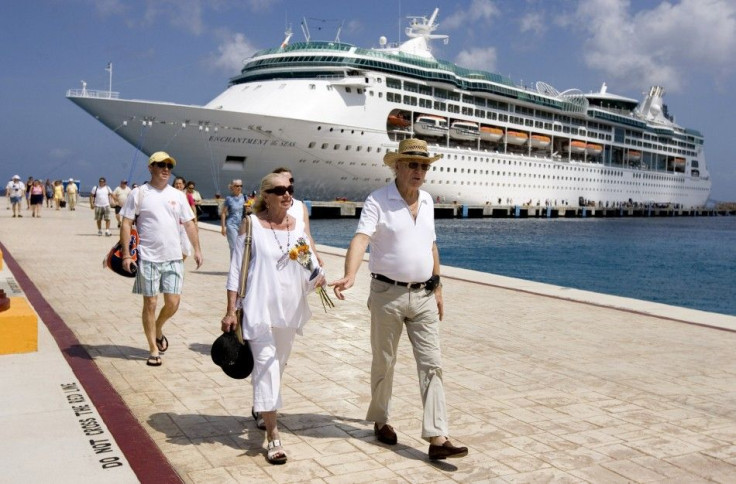Are Cruise Ships Liable For Dangers On Shore?

A newly reinstated negligence lawsuit against Carnival Cruise Line could become a pivotal piece of legislation in defining to what extent cruise ships may be held liable for criminal acts perpetrated against passengers at various ports of call.
The case, restored in a federal appeals court Wednesday, centers around 14-year-old Liz Marie Perez Chaparro, who was killed on St. Thomas in the U.S. Virgin Islands. The young girl was caught up in cross fire during a shootout at the funeral of a known gang member near a popular tourist beach, according to the complaint. Chaparro, her brother and their parents were riding in an open-air "safari taxi" past the funeral on their way back to the ship when it became stuck in traffic and the "gang-related retaliatory violence" erupted.
The girl's parents filed the lawsuit against Carnival, claiming that employees of the Victory cruise ship should have known about high crime rates in certain parts of the Virgin Islands. They should have warned the family, the complaint alleges, that the area near Coki Beach had been the scene of violent criminal activities and that there was to be a funeral that afternoon. Carnival personnel, they say, encouraged them to visit the beach, which was not one of the Carnival-endorsed shore excursions.
The family, from San Juan, Puerto Rico, was on vacation to celebrate the young girl's quinceañera. When she was shot in the side, an ambulance was called but never arrived. Eventually, the safari taxi sped away to the hospital, but the teen reportedly died in her father's arms.
As cruising numbers continue to rise, Chapparo's case may help define what role the $29 billion industry plays in protecting its passengers from dangers at its ships' ports of call.
"The facts alleged in the complaint are plausible and raise a reasonable expectation that discovery could supply additional proof of Carnival's liability," the U.S. Court of Appeals in Atlanta ruled Wednesday. The court cited a 1959 U.S. Supreme Court ruling that contends "a ship owner owes the duty of exercising reasonable care toward those lawfully aboard the vessel who are not members of the crew."
Carnival says it has no duty to warn passengers about such unforeseen events. In federal court in Miami, the cruise giant said it stops at a multitude of ports around the world and "cannot reasonably be expected to monitor or be aware of every single danger that may arise on any given street throughout a port city and beyond."
"Imposing upon cruise lines a duty to warn of each and every danger that exists in its hundreds of ports of call stretches the traditional duty of care too far," Carnival's lawyers said.
The judge in Miami dismissed the lawsuit last August, claiming it did not offer enough evidence of negligence by Carnival officials to permit it to proceed to trail. Though the judge invited the family's lawyers to submit a new complaint with additional evidence, they filed an appeal instead.
When reached for comment, Carnival representative Aly Bello-Cabreriza said the company could not discuss pending litigation.
Whether or not the cruise industry is responsible for such safety matters is up for debate. A Cruise Critic poll taken soon after the incident on St. Tomas found that 40 percent of respondents believe travelers should do their own research, compared with 30 percent who felt it is the responsibility of the cruise lines.
Yet, cruise expert Ross A. Klein, creator of CruiseJunkie.com and author of four books on the industry, including "Cruise Ship Blues: The Underside of the Cruise Ship Industry," said the industry does hold a certain obligation.
"They tell passengers what stores to go to for the best deals and where they will be treated fairly, so if they're going to tell them that stuff, why can't they tell them where they may be at risk of danger," he said. "You'd think that they would want to let people know. It's economically beneficial to treat people well so they want to come back and spend more money with you."
Klein, who says he worked on a similar case (settled out of court) against Carnival involving three passengers who died on a capsized glass-bottom boat in Cabo San Lucas, suggested that cruise lines put a column in the daily newspapers that are issued on ships informing passengers of the risks at each port. A blanket warning for all ports, he said, makes no sense.
For instance, though the U.S. Virgin Islands may be "America's paradise," it is the most violent and deadly in the U.S. on a per capita basis, with an average of about 40 homicides per 100,000 residents. That figure makes it the eighth-deadliest nation or territory in the world, according to the United Nation's Global Study on Homicide. By comparison, the United States, on average, has a crime rate of less than five homicides per 100,000 people.
While violence toward tourists is rare in the otherwise idyllic Virgin Islands, some, like Chaparro, find themselves in the wrong place at the wrong time. Or, perhaps, tourists like Chaparro unwittingly put themselves in dangerous situations, because they are ill informed. But is the cruise ship to blame? The courts may soon decide.
Read also: How Has The Cruise Industry Changed In 100 Years?
© Copyright IBTimes 2025. All rights reserved.






















